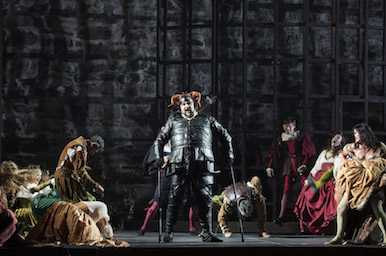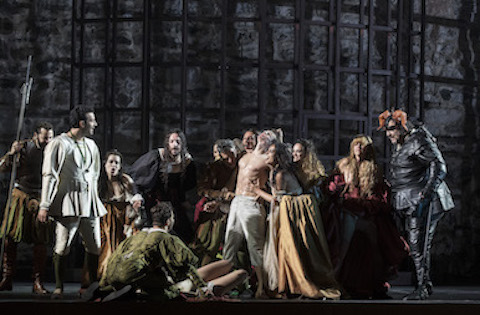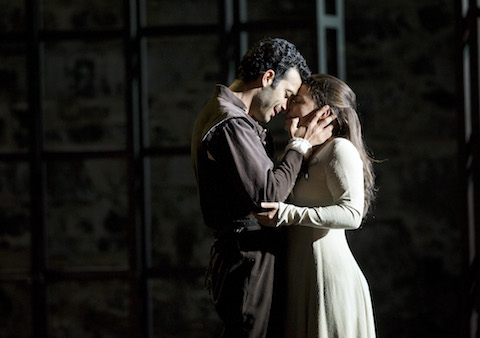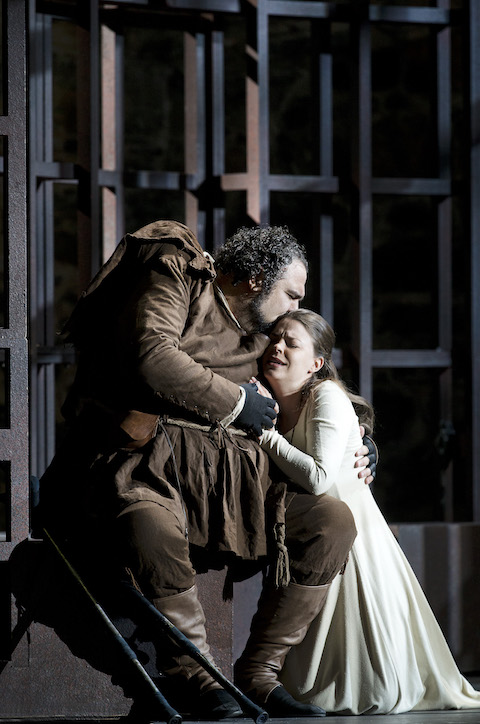Recently in Reviews
English Touring Opera are delighted to announce a season of lyric monodramas to tour nationally from October to December. The season features music for solo singer and piano by Argento, Britten, Tippett and Shostakovich with a bold and inventive approach to making opera during social distancing.
This tenth of ten Live from London concerts was in fact a recorded live performance from California. It was no less enjoyable for that, and it was also uplifting to learn that this wasn’t in fact the ‘last’ LfL event that we will be able to enjoy, courtesy of VOCES8 and their fellow vocal ensembles (more below …).
Ever since Wigmore Hall announced their superb series of autumn concerts, all streamed live and available free of charge, I’d been looking forward to this song recital by Ian Bostridge and Imogen Cooper.
The Sixteen continues its exploration of Henry Purcell’s Welcome Songs for Charles II. As with Robert King’s pioneering Purcell series begun over thirty years ago for Hyperion, Harry Christophers is recording two Welcome Songs per disc.
Although Stile Antico’s programme article for their Live from London recital introduced their selection from the many treasures of the English Renaissance in the context of the theological debates and upheavals of the Tudor and Elizabethan years, their performance was more evocative of private chamber music than of public liturgy.
In February this year, Albanian soprano Ermonela Jaho made a highly lauded debut recital at Wigmore Hall - a concert which both celebrated Opera Rara’s 50th anniversary and honoured the career of the Italian soprano Rosina Storchio (1872-1945), the star of verismo who created the title roles in Leoncavallo’s La bohème and Zazà, Mascagni’s Lodoletta and Puccini’s Madama Butterfly.
Evidently, face masks don’t stifle appreciative “Bravo!”s. And, reducing audience numbers doesn’t lower the volume of such acclamations. For, the audience at Wigmore Hall gave soprano Elizabeth Llewellyn and pianist Simon Lepper a greatly deserved warm reception and hearty response following this lunchtime recital of late-Romantic song.
Collapsology. Or, perhaps we should use the French word ‘Collapsologie’ because this is a transdisciplinary idea pretty much advocated by a series of French theorists - and apparently, mostly French theorists. It in essence focuses on the imminent collapse of modern society and all its layers - a series of escalating crises on a global scale: environmental, economic, geopolitical, governmental; the list is extensive.
For this week’s Live from London vocal recital we moved from the home of VOCES8, St Anne and St Agnes in the City of London, to Kings Place, where The Sixteen - who have been associate artists at the venue for some time - presented a programme of music and words bound together by the theme of ‘reflection’.
'Such is your divine Disposation that both you excellently understand, and royally entertaine the Exercise of Musicke.’
Amongst an avalanche of new Mahler recordings appearing at the moment (Das Lied von der Erde seems to be the most favoured, with three) this 1991 Mahler Second from the 2nd Kassel MahlerFest is one of the more interesting releases.
‘And there was war in heaven: Michael and his angels fought against the dragon; and the dragon fought and his angels, And prevailed not; neither was their place found any more in heaven … that old serpent … Satan, which deceiveth the whole world: he was cast out into the earth, and his angels were cast out with him.’
If there is one myth, it seems believed by some people today, that probably needs shattering it is that post-war recordings or performances of Wagner operas were always of exceptional quality. This 1949 Hamburg Tristan und Isolde is one of those recordings - though quite who is to blame for its many problems takes quite some unearthing.
There was never any doubt that the fifth of the twelve Met Stars Live in Concert broadcasts was going to be a palpably intense and vivid event, as well as a musically stunning and theatrically enervating experience.
‘Love’ was the theme for this Live from London performance by Apollo5. Given the complexity and diversity of that human emotion, and Apollo5’s reputation for versatility and diverse repertoire, ranging from Renaissance choral music to jazz, from contemporary classical works to popular song, it was no surprise that their programme spanned 500 years and several musical styles.
The Academy of St Martin in the Fields have titled their autumn series of eight concerts - which are taking place at 5pm and 7.30pm on two Saturdays each month at their home venue in Trafalgar Square, and being filmed for streaming the following Thursday - ‘re:connect’.
The London Symphony Orchestra opened their Autumn 2020 season with a homage to Oliver Knussen, who died at the age of 66 in July 2018. The programme traced a national musical lineage through the twentieth century, from Britten to Knussen, on to Mark-Anthony Turnage, and entwining the LSO and Rattle too.
With the Live from London digital vocal festival entering the second half of the series, the festival’s host, VOCES8, returned to their home at St Annes and St Agnes in the City of London to present a sequence of ‘Choral Dances’ - vocal music inspired by dance, embracing diverse genres from the Renaissance madrigal to swing jazz.
Just a few unison string wriggles from the opening of Mozart’s overture to Le nozze di Figaro are enough to make any opera-lover perch on the edge of their seat, in excited anticipation of the drama in music to come, so there could be no other curtain-raiser for this Gala Concert at the Royal Opera House, the latest instalment from ‘their House’ to ‘our houses’.
"Before the ending of the day, creator of all things, we pray that, with your accustomed mercy, you may watch over us."
Reviews

19 Jul 2017
McVicar’s Enchanting but Caliginous Rigoletto in Castle Olavinlinna at Savonlinna Opera Festival
David McVicar’s thrilling take on Verdi’s Rigoletto premiered as the first international production of this Summer’s Savonlinna Opera Festival. The scouts for the festival made the smart decision to let McVicar adapt his 2001 Covent Garden staging to the unique locale of Castle Olavinlinna.
With his traditional staging and dress, McVicar brings to life the grotesqueries of a Renaissance libertine court. Due to the censors of the time, Verdi had to relocate Rigoletto in Italian Mantua, but he based his opera on Victor Hugo’s “The King's Amusement” that recounts the life of libertine King Francois I. The lighting and ambience of McVicar's adaptation was hauntingly eerie, even though some of the singers couldn’t master the Castle’s acoustics. Mostly, though, the Finnish soloists offered the greatest quality in singing.
Manolov proved a sensational Rigoletto spanning a wide spectrum emotion. As a giant hunchback on crutches and covered in black leather, he appeared more a monstrosity than a court jester. Manolov sang full-blooded about his despair in his desire for his daughter’s safety, or of his anger towards the Duke and his court (unleashing a fury for kidnapping his daughter in “Cortigiani, vil razza dannata”). Before he is cursed by him, Manolov delivered biting wit in his rant against Monterone.
Juha Pikkarainen performed Manterone with deep, rounded sonority, especially in his grand entrance through one of Olavinlinna’s side portals. In the beginning, Pikkarainen easily overshadowed Lahaj’s Duke of Mantua.
In the beginning, Rame Lahaj’s Duke of Mantua worried me. As McVicar’s display of libertine syphilitic licentiousness (with young men howling like rabid dogs and coïtus coerced on Monterone’s daughter) took over the stage during the overture, the orchestra in full force led by Philippe Auguin, overpowered Lahaj’s voice. His “Questo o quella” lacked body and was almost inaudible; he failed to hold his own amongst the terrific choir (in scattered sexual acrobatics on stage). I was worried I was in for some poor singing tonight.
 Lahaj and Manolov as Mantua and Rigoletto amused by the court's licentiousness
Lahaj and Manolov as Mantua and Rigoletto amused by the court's licentiousness
But I was wrong, Lahaj seemed to be saving his voice for his solos later and for his duets with Gilda. During his “La donna è mobile” in the Final Act, with Auguin toning down the orchestra's volume, he sang decently, yet it still not was the Verdi showstopper I was hoping for. On the other hand, in his vocals with Gilda he managed sensitive dramatic chemistry during the quieter orchestral passages.
 Lahaj and Takala in sensitive romantic chemistry
Lahaj and Takala in sensitive romantic chemistry
Gilda's “Caro Nome” put Tuuli Takala’s lyrical coloratura up to full display. Her high notes were so pure and radiated innocence. Even when the speedboats jetted over the lake outside and disrupted her singing, Takala would amp her vibrato not letting anything interfere in her declarations of love to her father or the Duke. As Giovanna, Merja Mäkäla offered beautifully grounded contrasts to Takala’s transparent vocals.
Manolov and Takala made an excellent pairing as Rigoletto and Gilda, in their father and daughter relationship. Their duets made believable and deeply moving. In their chemistry, two singing actors created great drama.
 Manolov and Takala as father and daughter
Manolov and Takala as father and daughter
In supporting roles, Mika Kares contributed cunning intelligence to the assassin Sparafucile’s character. He performed wickedly together with a devilish Katarina Giotas as the conniving Maddalena, the sister Sparafucile emphatically pimps out in McVicar’s direction. Juha Riihimäki as Borsa and Jussi Merikanto as Marullo both sang decently. Though similarly to Lahaj, they also had some issues with the choir and orchestra’s force in Verdi’s music.
A magical moment occurred, during the storm in Act III. As lightning flashed brightly over the stage, a cold draft flowed through Castle Olavinlinna. As it passed the nape of my neck, right before the orchestra burst into a roaring tempest, it raised the hair on my arms and covered my back in goosebumps. A palpable tension hung in the air. Such moments make the castle such a thrilling locations for the right production.
After Manolov bowed over his dying Gilda at the end, and acknowledged Monterone with: “The Curse!”, the audience exploded in cheers. Yes the Finnish talent of this production received the applause (and loud stamping) it deserved. McVicar’s production proved a perfect fit for the Castle Olavinlinna.
David Pinedo
Cast and production information:
Duke of Mantua: Rame Lahaj; Gilda: Tuuli Takala; Rigoletto: Kiril Manolov; Giovanna: Merja Mäkelä; Sparafucile: Mika Kares; Maddalena: Katerina Giotas; Monterone: Juha Pikkarainen; Ceprano: Mikko Järviluoto; Countess Ceprano: My Johansson; Marullo: Jussi Merikanto; Borsa: Juha Riihimäki; Court usher: Roman Chervinko; Savonlinna Opera Festival Orchestra and Choir; Conductor: Philippe Auguin; Stage director: David McVicar; Stage design and costumes: Tanya McCallin; Lighting designer: David Finn; Movement director: Jo Meredith; Chorus master: Matti Hyökki; Olavinlinna Castle, Savonlinna Opera Festival, July 10, 2017.



